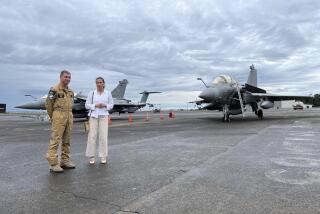Bush Pledges More U.S. Troops to Help Philippines
- Share via
WASHINGTON — Hailing the Philippines as a staunch ally in the war on terrorism, President Bush said Monday that he was ordering a new deployment of U.S. troops to help the island nation combat rebels on multiple fronts.
During a state visit here by Philippine President Gloria Macapagal Arroyo, Bush also announced about $100 million in new aid and equipment to help the Philippine armed forces. And he said the United States would designate the Philippines as a “major non-NATO ally,” making Manila eligible for additional U.S. arms.
“This step will allow our countries to work together on military research and development and give the Philippines greater access to American defense equipment and supplies,” Bush said at a White House news conference with Arroyo.
The designation puts the Philippines on the same footing as countries such as Australia, Israel and Egypt in terms of U.S. military ties, Bush said.
In another gesture of appreciation for Arroyo’s support of his foreign policy -- including the U.S.-led wars in Afghanistan and Iraq -- Bush accepted her invitation to pay a reciprocal state visit to Manila in October.
Bush did not specify how many U.S. troops he intends to deploy to support operations against Abu Sayyaf rebels in the southern Philippines. Washington has denounced the group as a terrorist organization with links to Al Qaeda.
Last year, Washington sent about 500 Special Forces troops to advise and train Philippine forces fighting the Abu Sayyaf. The Philippine government agreed that the U.S. troops could defend themselves if fired on, but they were prohibited from initiating combat operations.
This year, the U.S. agreed to send about 3,000 troops to help root out the Abu Sayyaf, including about 750 ground troops. But an outpouring of criticism forced the two governments to scrap the plan because it would have violated the Philippines’ constitutional ban on foreign troops engaging in combat there.
Arroyo’s government also has been fighting the Moro Islamic Liberation Front, which seeks independence for the southern Philippines, where most of the country’s Muslims live. That group has said it would regard U.S. assistance to Manila as “an invasion.”
Peace talks between the Philippine government and the MILF collapsed in February, after a government attack on a key rebel stronghold. Fighting has escalated in recent weeks; Arroyo announced a new offensive shortly before leaving for Washington.
Bush said Monday that if the group renounced violence and addressed its grievances through peaceful means, the United States would provide diplomatic and financial support for a renewed peace process.
In the meantime, Bush said, Washington and Manila are launching “a comprehensive review” of Philippine security requirements and how the U.S. can help the nation reform and modernize its military.
To that end, the White House announced grants of $30 million in counter-terrorism equipment and training to the Philippines, $30 million in development assistance for the southern island of Mindanao and for supporting a peace process with the MILF, and $25 million to train and equip a combat engineering unit. The U.S. also will send the Philippines 30 helicopters and as much as $10 million for equipment, spare parts and maintenance.
Bush said he would ask Congress to provide new benefits to World War II veterans from the Philippines who fought with U.S. forces against Japan, including higher disability compensation.
Arroyo is the first Asian leader to be accorded a state visit during the Bush administration. Bush regards a state visit as a high honor and has bestowed it on only two other presidents: Mexico’s Vicente Fox and Poland’s Aleksander Kwasniewski.
By contrast, President Clinton hosted about 30 state visits in his eight years in office, and Bush’s father hosted about 20 during his four years in the White House.
In her remarks, Arroyo said that the United States and the Philippines have enjoyed a relationship “rooted in our deep and long shared history” and that those ties became closer still after the Sept. 11 terrorist attacks against the U.S.
Having backed Bush in the war in Iraq, Arroyo is now sending a 175-member delegation of military police and medical personnel there to help with rebuilding.
More to Read
Sign up for Essential California
The most important California stories and recommendations in your inbox every morning.
You may occasionally receive promotional content from the Los Angeles Times.













